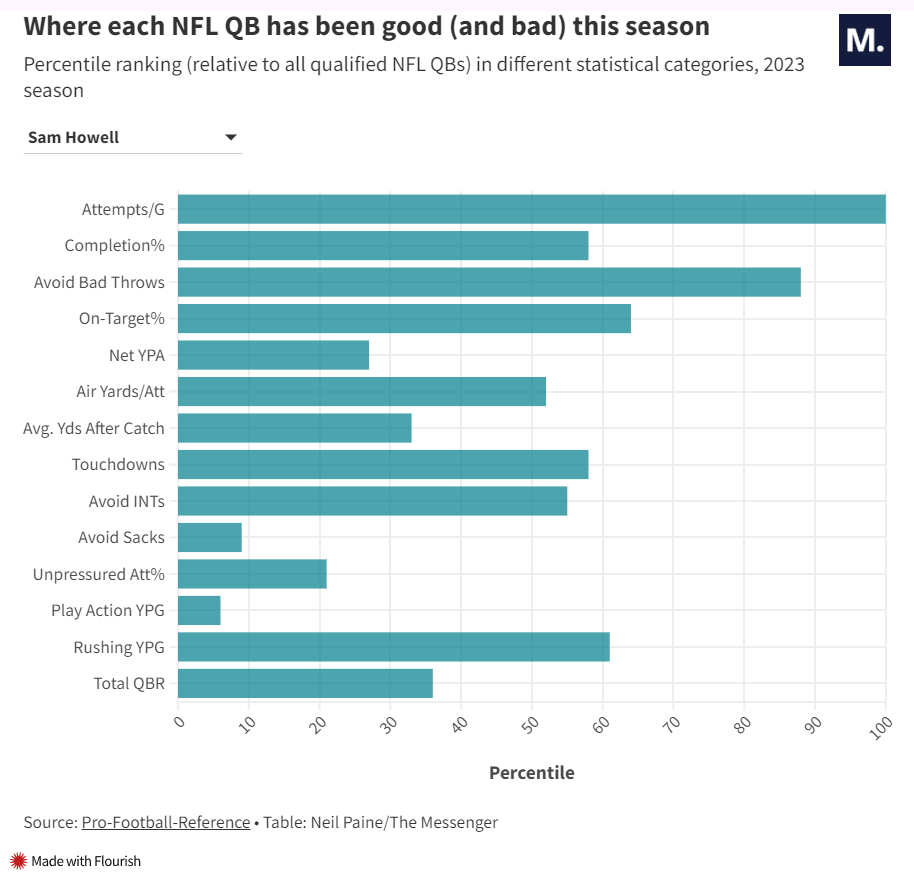C.J. Stroud’s Rookie Year Is Launching with a Bang
On the Texans QB’s sensational career start, and why it might last.
Everyone knows rookie quarterbacks are supposed to struggle early on, no matter how highly touted they are coming out of college. To wit: Trevor Lawrence, Andrew Luck and Peyton Manning — maybe the three most decorated QB prospects in modern history — all ranked among the NFL’s lowest-rated passers through the first four weeks of their debut campaigns. Eventually the game slows down and the supporting cast becomes more supportive, but until that happens, even future Hall of Famers can look confused.
Every once in a while, though, a first-year QB will buck that trend and start out his pro career on fire. Such is the case with Houston Texans signal-caller C.J. Stroud, who has helped engineer a pair of dominant wins over the Jacksonville Jaguars and Pittsburgh Steelers in the past two weeks — while also placing himself among the league’s top statistical quarterbacks in the early going. Let’s dig into where Stroud’s start ranks in the pantheon of early career hot streaks, and why he might (or might not) be able to keep it rolling.
Between his arm and his legs, the No. 2 pick in the 2023 draft currently ranks third in the NFL with 1,170 yards of total offense, and third among qualified QBs in adjusted net yards per attempt as well. The only other passer to combine such a high level of volume and efficiency is Tua Tagovailoa of the Miami Dolphins, and he’s one of the early frontrunners for league MVP this season. So it’s unusual to see a mere rookie mingle amongst such lofty company on the passing stat leaderboards. Just as surprising? The fact that Stroud is orchestrating an effective offense for a team that has seldom enjoyed one of those in recent seasons.
According to schedule-adjusted expected points added (EPA), the Texans are fifth in overall offensive value above average per game (+10.2) and third in passing specifically (+13.5). Not only would both marks be the best in franchise history if they held up over a full season, but it would be just the fourth time in the previous 11 seasons that Houston was above-average at all in either category. Putting aside the brief and ultimately checkered tenure of Deshaun Watson under center, this franchise has seen a lot more of Davis Mills and Brock Osweiler-style QB play than what Stroud has offered so far.
We can synthesize both Stroud’s individual and team-oriented excellence by calculating Pro-Football-Reference’s Approximate Value (AV) for other debut QBs throughout history. AV is useful because it contextualizes a player’s personal stats within the framework of his team’s offensive or defensive success, meaning gaudy performances must also help the squad win. And among rookies in the first four games of their debut seasons, Stroud ranks fourth-most valuable since the 1970 AFL-NFL merger by that measure:
For the other QBs on that list, some saw their early success lead to stardom — while some didn’t. Luck, Dak Prescott and Cam Newton each flashed the potential of what was to come by their first handful of games. But Robert Griffin III and Carson Wentz never lived up to their early promise, in part because of injuries. And it’s tough to know what to make of Watson’s complicated history on and off the field. It’s certainly better for Stroud to play well than not, though — and he does have some examples to follow if he’s going to translate his rookie performance into something with more staying power.
We can also see signs of what makes Stroud great by using this handy interactive comparison tool I made. For each qualified quarterback this season, I calculated their percentile rankings in more than a dozen important categories that tell us what kind of QB they are and what they do well. Here’s Stroud’s chart:
We immediately see that he is above average in plenty of areas, from raw passing volume to net yards per attempt, air yards per attempt, touchdown rate and (especially) avoiding interceptions. He’s done all of this while also having one of the lowest rates of unpressured throws — meaning the defense has been in his face often, which shows impressive composure for a young QB.
One factor that suggests Stroud will come back down to earth, however, is a general lack of accuracy; he is below league average at making throws on target, avoiding bad throws and generally completing passes. He’s been relying a lot on his receivers to run after the catch to rack up yardage. And while it may seem like avoiding picks is a good thing, a low interception rate is generally more the product of randomness and less about the QB’s own ability, with some exceptions.
But even if Stroud eventually stops sitting alongside Tagovailoa, Patrick Mahomes and Josh Allen in the QB rankings, there’s a lot to like in his early play. Our default impulse should always be to grade rookie passers on a curve, particularly in their first few weeks of figuring out NFL defenses. For Stroud, though, no such adjustments have been necessary so far — he’s making the rest of the league work to prove they can stop him.
Filed under: NFL








Love the interactive graphic. Well done.